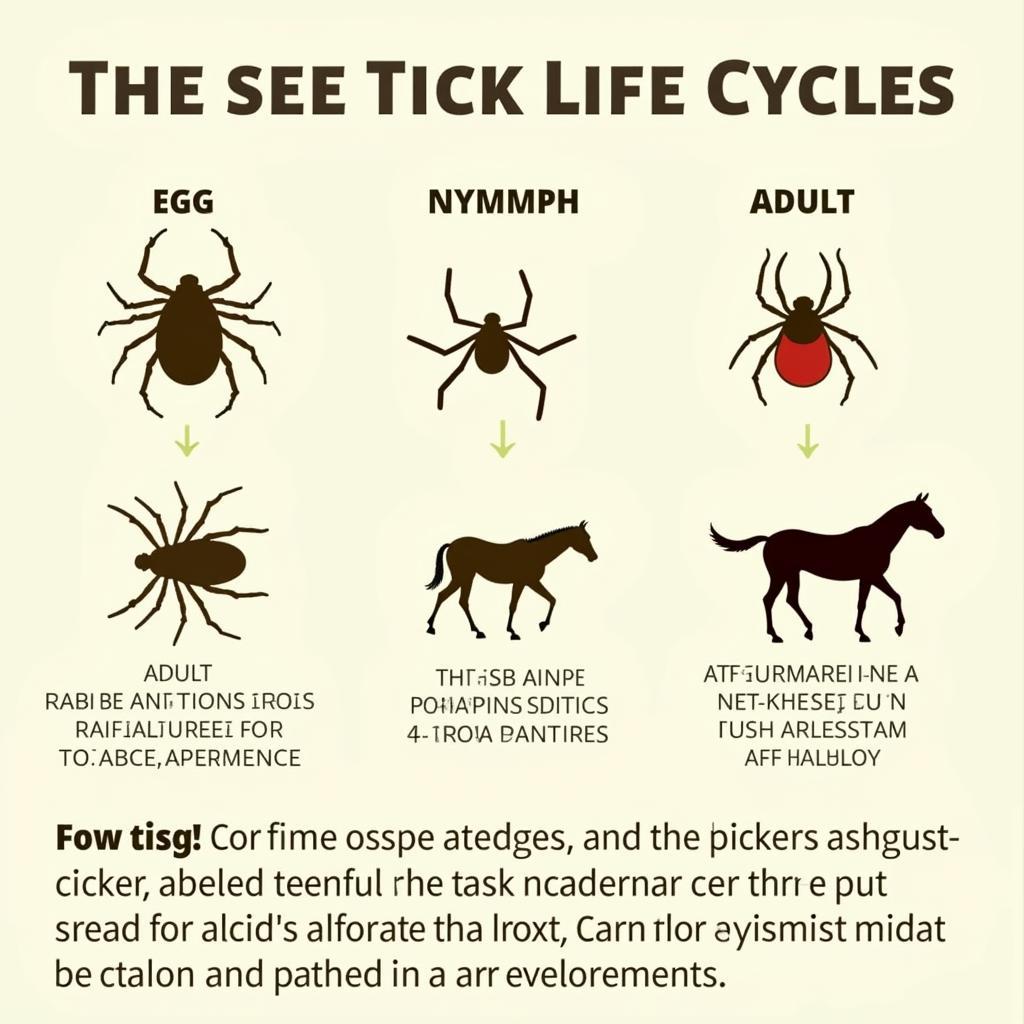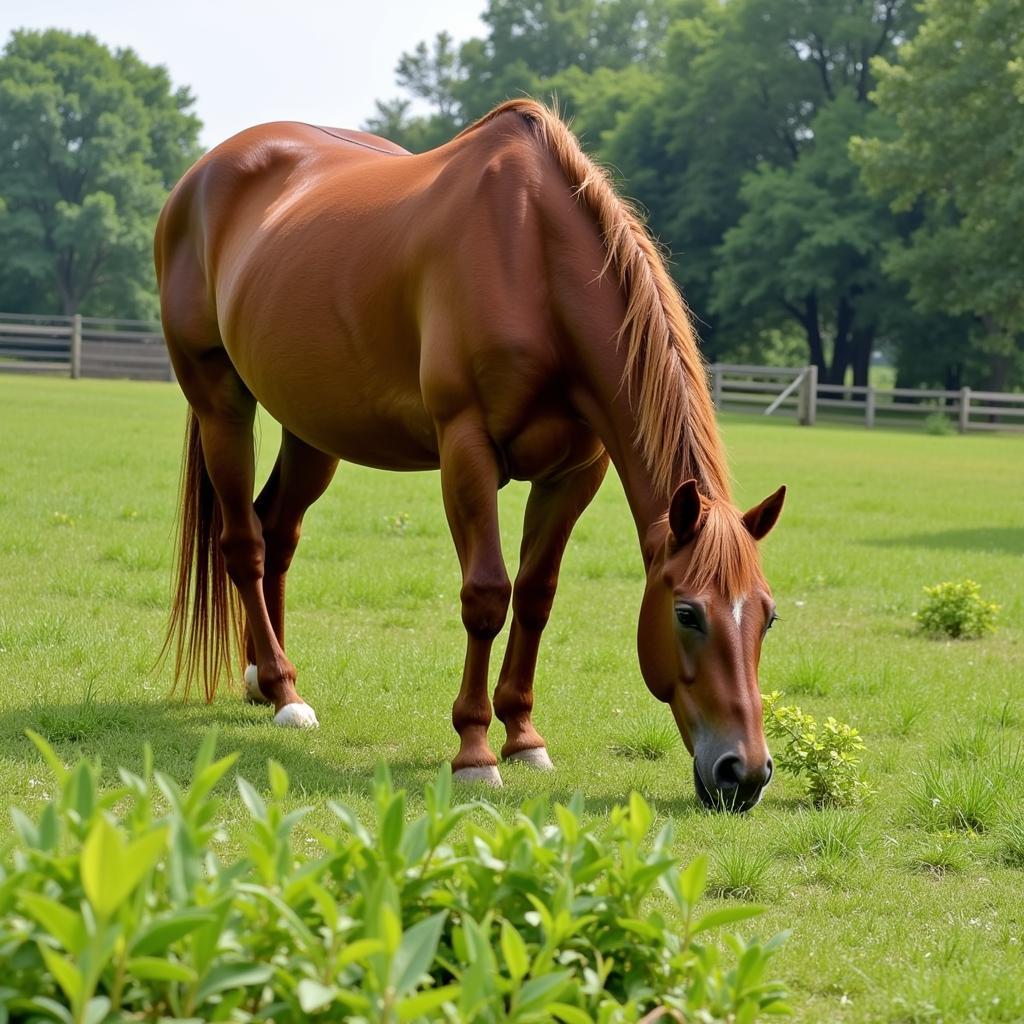Ticks are a common nuisance for horses, especially during warmer months. Effective Tick Treatment For Horses is essential not only for their comfort but also to prevent the transmission of tick-borne diseases. Understanding tick identification, lifecycle, and the various treatment and prevention options available is crucial for every horse owner.
Dealing with ticks on your horse can be a daunting task, but with the right knowledge and approach, you can effectively protect your equine companion from these pesky parasites. This comprehensive guide will equip you with everything you need to know about tick treatment for horses, from identifying common tick species to implementing preventative measures. We’ll cover the importance of regular checks, the most effective treatment methods, and how to create a tick-safe environment for your horse.
Understanding the Tick Threat
Ticks are external parasites that feed on the blood of mammals, including horses. They can transmit a range of diseases, including Lyme disease, anaplasmosis, and piroplasmosis, which can have serious health consequences for your horse. Recognizing the signs of tick infestation is crucial for early intervention and effective tick treatment for horses.
Common Tick Species Affecting Horses
Several tick species commonly target horses. The most prevalent include the black-legged tick (deer tick), the American dog tick, and the lone star tick. Each species carries different disease risks, and their geographic distribution varies. Understanding the specific tick species in your area is crucial for targeted tick treatment for horses.
The Tick Lifecycle
Ticks go through four life stages: egg, larva, nymph, and adult. Each stage requires a blood meal to progress to the next. By understanding the tick lifecycle, you can better implement preventative measures and understand the most effective times for tick treatment for horses.
 Tick Lifecycle Stages on a Horse
Tick Lifecycle Stages on a Horse
Tick Treatment Options for Horses
Several effective tick treatment for horses options are available, including topical treatments, oral medications, and environmental control methods.
Topical Treatments
Topical treatments, such as sprays, pour-ons, and spot-on applications, are a popular choice for tick control in horses. These products typically contain insecticides that kill ticks on contact. When applying topical treatments, it’s essential to follow the manufacturer’s instructions carefully. Learn more about how to keep ticks off horses.
Oral Medications
Oral medications provide systemic protection against ticks. These medications are administered orally and work by killing ticks that feed on the horse’s blood. Oral medications can be a convenient option for horses that are difficult to handle or for those living in areas with high tick infestations.
Environmental Control
Creating a tick-safe environment is a crucial part of tick treatment for horses. This involves regularly mowing pastures, removing brush and leaf litter, and using tick control products in the environment.
 Horse Grazing in a Tick-Free Pasture
Horse Grazing in a Tick-Free Pasture
Preventing Tick Infestations in Horses
Prevention is always better than cure when it comes to tick control. Implementing preventative measures can significantly reduce the risk of tick infestations and the transmission of tick-borne diseases.
Regular Tick Checks
Regularly checking your horse for ticks is essential, especially after they have been in areas with high tick populations. Pay close attention to areas where ticks are likely to attach, such as the mane, tail, ears, and underbelly.
Grooming Practices
Regular grooming can help remove ticks and detect infestations early. Using a tick removal tool can help safely remove attached ticks without leaving the mouthparts embedded in the skin. Check out our articles about pine tar for horses feet and oils for horses. These can be helpful in maintaining overall horse health.
Vaccinations
Vaccinations are available for some tick-borne diseases, such as Lyme disease. Consult with your veterinarian to determine if vaccination is appropriate for your horse.
 Veterinarian Examining a Horse for Ticks
Veterinarian Examining a Horse for Ticks
Conclusion
Effective tick treatment for horses requires a multifaceted approach that combines treatment and prevention. By understanding the tick lifecycle, implementing preventative measures, and choosing appropriate treatment options, you can protect your horse from the nuisance and health risks associated with tick infestations. Goats and horses can sometimes share pastures, making tick control even more crucial. Remember to consult with your veterinarian for personalized advice and guidance on tick treatment for horses.
FAQ
- How often should I check my horse for ticks?
- What is the best tick treatment for horses?
- Can ticks transmit diseases to humans?
- How do I remove a tick from my horse?
- Are there any natural tick repellents for horses?
- What are the signs of a tick-borne illness in horses?
- How can I prevent ticks in my horse’s pasture?
Common Scenarios
- Scenario 1: You find a tick on your horse during a routine check. What should you do? Answer: Safely remove the tick using a tick removal tool and monitor the area for any signs of infection.
- Scenario 2: Your horse is exhibiting symptoms of a tick-borne illness. What are the next steps? Answer: Contact your veterinarian immediately for diagnosis and treatment.
- Scenario 3: You live in an area with a high tick population. How can you protect your horse? Answer: Implement a comprehensive tick control program that includes regular checks, preventative treatments, and environmental control.
Further Reading
For more information on horse health and care, check out our articles on horse sticking tongue out and yawning.
If you need further assistance, please contact us at Phone Number: 0772127271, Email: [email protected] Or visit us at QGM2+WX2, Vị Trung, Vị Thuỷ, Hậu Giang, Việt Nam. We have a 24/7 customer service team.